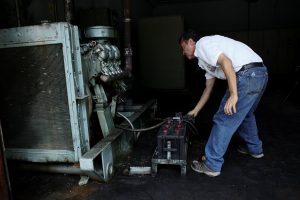
By Anggy Polanco and Isaac Urrutia
SAN CRISTOBAL, Venezuela (Reuters) – Venezuela imposed electricity rationing this week in six western states, as the crisis-hit country’s creaky power grid suffered from a drought that has reduced water levels in key reservoirs needed to run hydroelectric power generators.
The four-hour formal outages began on Thursday. But many residents scoffed at the announcement, wryly noting that they have been suffering far more extended blackouts during the last week.
“We have spent 14 hours without electricity today. And yesterday electricity came and went: for six hours we had no power,” said Ligthia Marrero, 50, in the western state of San Cristobal, noting that her fridge had been damaged by the frequent interruptions.
Crumbling infrastructure and lack of investments have hit Venezuela’s power supply for years. Now, the situation has been exacerbated by dwindling rains.
In the worst-hit western cities, business has all but ground to a halt at a time when the OPEC nation of 30 million is already suffering hyperinflation and a profound recession. Many Venezuelans are unable to eat properly on salaries of just a couple of dollars per month at the black market rate, sparking malnutrition, emigration and frequent sights of Venezuelans digging through trash or begging in front of supermarkets.
Maybelin Mendoza, a cashier at a bakery in Tachira state, said business has been further hit because points of sale stop working during blackouts – just as Venezuelans are chronically short of cash due to hyperinflation.
In the most dramatic cases, the opposition governor of Tachira state said three people, including a four-month-old, died this week because they failed to receive assistance during a power outage.
“Because of electrical failures, the machines weren’t able to revive the people and they died,” said Laidy Gomez.
Reuters was unable to confirm the report.
Authorities have acknowledged that interruptions will continue for at least two weeks, but they have not said whether they will spread to other states.

A worker tries to start the generator of the Padre Justo hospital during a blackout in Rubio, Venezuela March 14, 2018. Picture taken March 14, 2018. REUTERS/Carlos Eduardo Ramirez
“Of a possible 1,100 megawatts, we are only generating 150 right now,” Energy Minister Luis Motta told reporters referring to the Fabricio Ojeda dam, in the western Andean state of Merida.
Capital city Caracas and other major cities have not been hit by rationing yet. Two years ago, rationing there lasted five months when a drought hit the Guri dam, the country’s largest hydroelectric dam.
But because of the economic crisis, Venezuela has reduced electricity consumption to about 14,000 megawatts at peak hours, according to engineer and former electricity executive Miguel Lara. Two years ago, state-run Corpoelec put the figure at 16,000 megawatts.
(Writing by Andreina Aponte and Girish Gupta; Editing by Corina Pons, Alexandra Ulmer and David Gregorio)